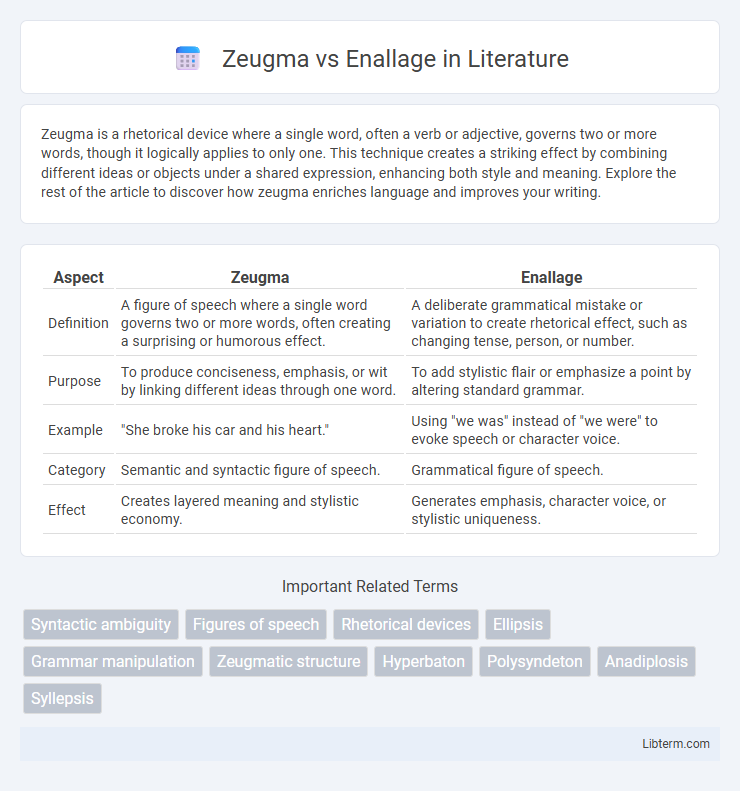Zeugma is a rhetorical device where a single word, often a verb or adjective, governs two or more words, though it logically applies to only one. This technique creates a striking effect by combining different ideas or objects under a shared expression, enhancing both style and meaning. Explore the rest of the article to discover how zeugma enriches language and improves your writing.
Table of Comparison
| Aspect | Zeugma | Enallage |
|---|---|---|
| Definition | A figure of speech where a single word governs two or more words, often creating a surprising or humorous effect. | A deliberate grammatical mistake or variation to create rhetorical effect, such as changing tense, person, or number. |
| Purpose | To produce conciseness, emphasis, or wit by linking different ideas through one word. | To add stylistic flair or emphasize a point by altering standard grammar. |
| Example | "She broke his car and his heart." | Using "we was" instead of "we were" to evoke speech or character voice. |
| Category | Semantic and syntactic figure of speech. | Grammatical figure of speech. |
| Effect | Creates layered meaning and stylistic economy. | Generates emphasis, character voice, or stylistic uniqueness. |
Introduction to Zeugma and Enallage
Zeugma is a rhetorical device where a single word, typically a verb or adjective, governs two or more words or clauses, creating a distinct stylistic effect. Enallage involves the deliberate substitution of one grammatical form for another, such as changing verb tense or person, to produce emphasis or character voice. Both devices enhance expression by manipulating language structure to engage readers and emphasize meaning in creative ways.
Defining Zeugma: Meaning and Usage
Zeugma is a rhetorical device where a single word, typically a verb or adjective, governs two or more parts of a sentence, often blending different ideas or actions to create a stylistic effect. It is used to evoke surprise or highlight contrasts by linking seemingly unrelated elements through one word, such as in the phrase "She broke his car and his heart." Zeugma's versatility in literature and speech makes it a powerful tool for emphasizing relationships between concepts and enriching the narrative texture.
Understanding Enallage: Concept and Application
Enallage involves the deliberate substitution of one grammatical form for another to create emphasis or stylistic effect, often altering verb tense, number, or person. This rhetorical device enhances narrative voice and can convey character or tone more vividly by breaching standard grammar rules. Understanding enallage enriches literary analysis by revealing nuanced meaning and authorial intent in texts from classical to contemporary literature.
Historical Origins of Zeugma and Enallage
Zeugma originated in classical Greek and Latin literature, where poets and orators used it to create rhetorical effects by linking multiple clauses through a shared word, often a verb or adjective. Enallage dates back to ancient rhetorical traditions as well, arising from the flexibility of Greek and Latin grammar to intentionally substitute grammatically correct forms, such as tense or person, for stylistic emphasis. Both figures of speech were extensively studied by Aristotle and later Roman rhetoricians, who codified their use in persuasive and poetic texts.
Structural Differences Between Zeugma and Enallage
Zeugma involves a single word governing multiple parts of a sentence, creating a link between different clauses or phrases, often blending grammatical structures or meanings for rhetorical effect. Enallage, by contrast, is a deliberate grammatical mistake or shift, such as changing verb tense, person, or number within a sentence to produce stylistic variation or emphasis. The primary structural difference lies in zeugma's shared word function across sentence elements versus enallage's intentional alteration of grammatical forms to disrupt standard syntax.
Common Examples of Zeugma in Literature
Zeugma often appears in literature through phrases where a single verb governs multiple objects, such as in Alexander Pope's line, "He lost his coat and his temper," illustrating the device's ability to create a dramatic or humorous effect by linking disparate ideas. Common examples include Charles Dickens' use in "Bleak House," where words like "held" function in multiple senses simultaneously, enhancing narrative depth. This rhetorical figure contrasts with enallage, which involves a deliberate grammatical shift, emphasizing stylistic variation rather than syntactical linkage.
Notable Uses of Enallage in Writing
Enallage, a rhetorical device involving the deliberate misuse of grammar for stylistic effect, appears prominently in literary works such as Shakespeare's plays, where shifts in person or tense highlight character emotions or themes. Notable examples include Hamlet's soliloquy, which employs changes in verb forms to reflect internal conflict and instability. This contrasts with zeugma, which involves a single word linking different parts of a sentence, often creating a witty or dramatic effect.
Rhetorical Effects: Zeugma vs Enallage
Zeugma creates a striking rhetorical effect by linking two different elements with a single word, often producing surprise or humor through unexpected connections. Enallage enhances persuasive impact by intentionally altering grammar or syntax, such as shifting tense or number, to draw attention or emphasize a point. Both devices enrich language expressiveness: zeugma through economy and wit, enallage through emphasis and stylistic variation.
Tips for Using Zeugma and Enallage Effectively
Use zeugma by linking a single verb or adjective to multiple nouns, creating a concise and impactful expression that enhances readability and engages the reader. Apply enallage to intentionally alter grammar or syntax, such as shifting tense or person, to add emphasis or convey character voice authentically. Balance clarity and creativity by ensuring zeugma and enallage serve the text's purpose without confusing the audience, enriching narrative style and rhetorical strength.
Conclusion: Choosing Between Zeugma and Enallage
Choosing between zeugma and enallage depends on the desired rhetorical effect and clarity in writing. Zeugma creates a striking stylistic impact by linking disparate elements with a single word, enhancing emphasis and wit, while enallage shifts grammatical forms to convey voice or mood variations, enriching the narrative tone. Writers should select zeugma for dramatic, playful contrasts and enallage for subtle grammatical nuances that deepen character or style.
Zeugma Infographic

 libterm.com
libterm.com